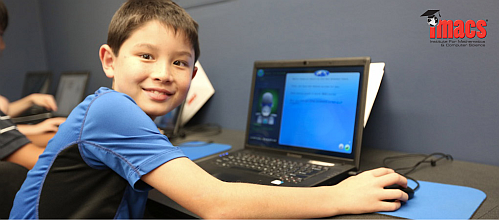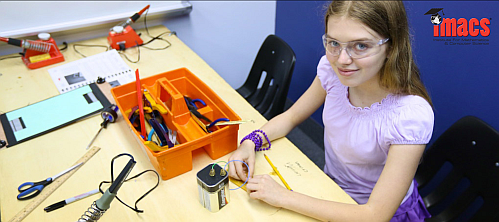
A recent study published in the Philosophy of Mathematics Education Journal confirms that teachers’ images of mathematics and their mathematics history knowledge are interlinked. According to the study’s lead author, Danielle Goodwin of the Institute for Mathematics and Computer Science (IMACS), "By and large, the teachers with low history scores in this study were the teachers who exhibited narrow, negative views of mathematics."
Key findings from the study include:
- Respondents with low history scores
- were more likely to indicate that they believed mathematics overall was like "cooking a meal" or "a tool for use in everyday life."
- were more likely to believe that mathematics is a disjointed collection of facts, rules and skills than respondents with high history scores.
- appeared to be more likely to agree with the statement that "the process of doing mathematics is predictable" than those with higher history scores.
- Respondents with high history scores
- exhibited more favorable views of mathematics.
- were more likely to indicate that they believed mathematics overall is like "doing a dance" or "an art, a creative activity, the product of the imagination."
- disagreed more often with the statement "everything important about mathematics is already known" than did their low-scoring counterparts.
Attitudes Influence Decisions that Affect Students
Why does this matter? Because educators’ views of mathematics affect student learning experiences in a variety of ways, from daily classroom instruction to curriculum selection and development to far-reaching proposals for national math education reform.
Teachers’ images of math are typically based on their own limited experiences as young students, and so teacher education programs should incorporate mathematics history into their curriculum as a way of reshaping attitudes, the study suggests. Doing so would help future teachers develop an appreciation for and understanding of math as a subject that is alive and fundamentally creative. Fostering this viewpoint could help teachers help their students understand that mathematics is a natural place for inventive problem-solving where questioning and investigating are highly valued.
"Teachers who have rule-oriented images of mathematics can weaken student learning by representing mathematics in misleading ways," says Goodwin. Instead of conveying as healthy the struggle of intellectual discovery that naturally takes place in mathematics when new ideas are explored, "struggle" in US K-12 math classrooms has come to mean being "bad at math." This unfortunate association has left generations of Americans hating math and believing in the myth that they are not "math people."
Current teachers and pre-service teachers who want to improve their ability to teach math don’t have to wait for curriculum changes at schools of education. There are wonderful and accessible resources that provide a willing and curious mind with a deeper understanding of mathematics in the context of its rich history.
Recommended Reading and Viewing
If you’re still looking for a holiday gift for your child’s math teacher, perhaps one of the recommended books below would be appreciated. For the visually-inclined,
the videos and movies that follow provide many hours of awe-inspiring and sometimes humorous enlightenment.
- Books:
- Journey through Genius: The Great Theorems of Mathematics by William Dunham
- The Man Who Loved Only Numbers: The Story of Paul Erdos and the Search for Mathematical Truth by Paul Hoffman
- e: The Story of a Number by Eli Maor
- Women in Mathematics by Lynn M. Osen
- The Joy of Pi by David Blatner
- Gödel, Escher, Bach: An Eternal Golden Braid by Douglas R. Hofstadter
- Videos and Movies:
- Mathematics: Making the Invisible Visible, a five-lecture survey course by Stanford mathematics professor Keith Devlin
- A Mathematical Mystery Tour, BBC documentary looking at some of the greatest problems in the history of mathematics, some of which have since been solved
- Fermat’s Last Theorem, BBC documentary about mathematician Andrew Wiles’ proof of Fermat’s Last Theorem
- The Story of 1, BBC documentary about the history of numbers
- A Beautiful Mind starring Russell Crowe as mathematician John Nash (PG-13)
- The Imitation Game starring Benedict Cumberbatch as mathematician and computer scientist Alan Turing (PG-13)
Like IMACS on Facebook for the latest information about our local classes and online courses.
This month’s IMACS Blog features Shiva Oswal, one of the top performers in our Elements of Mathematics: Foundations (EMF) self-paced, online program for talented secondary school students. Shiva has been enrolled in EMF since the beginning when IMACS introduced the first course of the series in late 2012. As his mom told us, “[O]ur son is an avid user of online educational resources. I recently asked him to pick his favorite online course. He answered, ‘most definitely EMF, by a wide margin’.”
Please tell our readers a little bit about yourself and what you enjoy doing.
I’ll be turning 11 soon, and I love the EMF courses! As a history buff, I really enjoy reading about decisive battles in world history. I also like playing board games and computer games. Right now my favorite board game is Robo Rally, and my favorite computer game is Castle Empire. On the weekends, I participate in Live Action Role-Playing (LARP) events. Soccer is another activity I enjoy. My favorite position is goalie.
You’ve done some amazing things already at a young age. Tell us about the accomplishments of which you are most proud.
This year, I scored 24 out of 25 to earn a gold pin in the Mathematical Olympiads for Elementary and Middle Schools (MOEMS), and was named MOEMS “Mathlete of the Year” for my geographic region. I also invented a new board game called “Minetrap”. I am currently working on publishing my game. If you would like updates, email me at shivarasul [at] gmail [dot] com. Finally, I completed the first seven EMF courses and am almost finished with the eighth course. I am excited to start the ninth course, Number Theory soon.
How did you become interested in mathematics?
When I was in preschool, I was doing multiplication. When math in regular school became too easy, I decided to homeschool so I could work on challenging math problems and concepts.
How did you become interested in taking EMF courses?
My mom encouraged me to try the EMF courses, and I’ve been hooked ever since.
What are the things you enjoy most about EMF?
I like the way concepts are explained. The format of EMF courses, reading followed by exercises, helps check my understanding. The interactive tools such as The String Game make learning math fun. Also the point system (i.e., ability to level up based on mastery of material) makes EMF addictive.
What are some ways in which your EMF experience has had a positive effect on your academic and non-academic pursuits?
When I did my first EMF course, Operational Systems, I was very new to the field. I learned a great deal about operational systems and modular arithmetic after I completed this course. I have grown by leaps and bounds as an analytical thinker as EMF courses force me to think. The program has also helped me improve my skills at strategy games like chess.
What kinds of things do you see yourself doing in the future?
First and foremost, I would like to complete all 15 EMF courses. I hope to get to Calculus before I’m 13 years old. I am also working on becoming a professional soccer player.
Thank you, Shiva, for sharing your story and congratulations on your amazing accomplishments!
Discover why the Elements of Mathematics: Foundations program from IMACS is an excellent option for your mathematically talented middle-school-aged child.
Half Price Holiday Sale: Try the first course, Operational Systems, at 50% off the regular price when you enroll on or before December 20, 2014.
Bundled Savings: Save 25% on EMF Course Pack 9, which includes the first nine courses, when you enroll on or before December 20, 2014.
Tomorrow is Halloween! Whether it’s watching a horror movie or jumping out from behind a door, many people find it fun to be scared or scary on this holiday. It’s also a good time to revisit what parents can do to keep their children from becoming afraid of math. Math anxiety is unnecessarily common in the United States. As a country we have focused intentily on promoting foundational literacy skills, but numeracy skills can also be fostered from an early age. At home, don’t just read to your toddler and pre-schooler; “math” to them also. Get down on the floor with your kids and some blocks to show them what “more” and “less” and different numbers actually mean. Make patterns out of just about anything age-safe such as different color socks or whole fruits and vegetables. When your kids are around 5-6 years old, playing with coins (counting and adding pennies, exchanging coins, etc.) on the floor is another fun activity.
Math outdoors is fun too! Go to the park and arrange rocks or wood chips into rows and columns. Draw shapes in the sandbox. Are there shapes that look the same no matter where you stand? Which shapes look like they’ve flipped or turned? Make shapes out of sticks. Compare the sticks. Which is longer? Which is shorter? Add sticks to go from a triangle to a rectangle to a pentagon and so on. If you keep adding sticks, what does your shape start to look like? (Don’t freak out, but you just did a little Calculus.)
Good old-fashioned floor time or outdoor time are excellent ways of cementing learning with positive memories. As your kids get older, make sure they are exposed regularly throughout their childhood and adolecense to adults who explain math well and enjoy it, especially if you don’t. And if you have math anxiety yourself, make that your best-kept secret. Math doesn’t have to be scary.
Now, what do you get when you take the circumference of a jack-o-lantern divided by its diameter? Answer: A pumpkin π. Happy Halloween from IMACS!
Once upon a time, there was a bright student who first came to IMACS when he was already in high school. He was interested in learning to program and had heard high praise for our University Computer Science courses. The class began smoothly as teacher and pupil progressed through the principles of computational thinking. This student, who was used to conquering schoolwork with his brain tied behind his back, slayed the early exercises with ease. As the assignments quickly became more challenging, however, he found himself unaccustomed to the effort of intellectual struggle. One day, our earnest student declared to his IMACS instructor that a certain programming problem was simply impossible to solve! Our wise and experienced teacher considered this student with a measured gaze and pointed out, “But you’ve only thought about it for three minutes.” The student, quite politely, seriously, and honestly replied, “Well, yeah.” If only he had started IMACS when he was younger. The moral of the story: The earlier the experience of true intellectual challenge, the stronger the will of the mind to persevere. (In other words, enroll your elementary school child in IMACS today!)
in the Fort Lauderdale Ballet Classique’s 40th Annual Nutcracker.
This month the IMACS Blog caught up with Azzara Nincevic, who has been a star student at IMACS for seven years now. Azzara enjoys reading, drawing, and classical ballet. Although she dances at least 12 hours per week and performs throughout the year, she always finds time for IMACS.
“When I began IMACS in first grade, I immediately loved it.” Azzara says. “Having taken an interest in math, I quickly learned the traditional material and was looking for more challenging enrichment. When I attended class at IMACS, all of the problems were thought-provoking.”
As a member of her school’s math team, Azzara attends competitions such as MATHCOUNTS and Mu Alpha Theta where her IMACS background has been an invaluable asset. As Azzara describes it, “The IMACS curriculum helped me to develop logical thinking skills and the ability to quickly solve math problems, which are key to succeeding at math competitions.”
“With the preparation that IMACS gave me, I was able to score a 5 on the AP® Computer Science exam as a seventh grader.”
While Azzara’s achievements in mathematics and ballet, by themselves, are enough to impress anyone, it’s her recent performance on the AP® Computer Science A exam that readers will recognize as a rare feat. Soon after starting IMACS Math Enrichment program, Azzara enrolled in our Computer Enrichment & Virtual Robotics class where she developed a great interest in programming. Over the years, she continued with IMACS University Computer Science (UCS) track, which culminates in our AP® Computer Science: Java Programming course.
AP® exams are typically administered to high school students, but at the time that Azzara was ready for APCS, she was only just entering seventh grade. That didn’t deter her. “After inquiring, my mom and I found out that there is no minimum age requirement for an AP® exam, so I registered. With the preparation that IMACS gave me, I was able to score a 5 on the AP® Computer Science exam as a seventh grader.”
With such a busy schedule, Azzara appreciates that one of the greatest benefits of IMACS is that the computer science and logic programs are accessible online and self-paced. “I was able to excel at my own pace and access the IMACS curriculum anytime and anywhere.”
What does the future hold for Azzara? “I am entering the eighth grade with a greater passion for and interest in math and computer science. IMACS made me realize that I would like to pursue computer science in college and after. The fundamental skills that I have learned in the UCS courses and the logical thinking skills I have learned in the Math Enrichment and Mathematical Logic courses give me the advantage I need to be successful. As such, I plan to continue with IMACS in the upcoming years.”
Homeschooling is growing in the United States, having shifted from the "fringe" toward the mainstream. In January 2014, the National Home Education Research Institute (NHERI) estimated that there were 2.2 million1 K-12 home-educated students in the US, up from an estimated 1.5 million2 in 2007. According to the NHERI, one of the most common reasons that families choose homeschooling is to "customize or individualize the curriculum and learning environment for each child." Not surprisingly, families with gifted children make up a significant part of the current homeschool movement.
If you thought that homeschooling meant having to teach your child all subjects on your own while sitting together at the kitchen table until you drive each other crazy, think again. Modern technology has opened up a world of educational opportunities. Online courses abound in every subject you could imagine. Social media allows homeschool parents to connect and form co-ops where they can share the work of teaching. Some public school districts offer classes taught by credentialed teachers several days a week at a homeschool campus. And numerous educational organizations offer local day classes for homeschoolers, such as the IMACS Homeschool Program. The job of teaching no longer has to be carried out solely by the homeschool parent.
Homeschooling also supports the need that many gifted students have to be self-directed learners. As eIMACS student and 2011 US Girls Junior (U21) Chess Champion Rachel Gologorsky said, "I recognized this as an excellent opportunity to have a say in my education." In addition to allowing her to participate in the decision-making process, homeschooling provides Rachel with the flexibility she needs to develop her incredible chess talent, including travelling to national and international competitions.
Another oft-cited benefit of homeschooling is the freedom to custom-tailor an educational program that is matched, subject by subject, to a student’s abilities, learning style, and processing speed. Children can fully develop their strongest areas by going as deeply into a subject as they wish or by advancing as quickly as they are able while getting the appropriate level of support they need in other areas. This can be a good fit for many gifted children who, contrary to common misconceptions, are not always the fastest or highest achieving in every subject.
Consider what mathematician and hedge fund billionaire, James Simons, said in a recent New York Times article: "I wasn’t the fastest guy in the world," Dr. Simons said of his youthful math enthusiasms. "I wouldn’t have done well in an Olympiad or a math contest. But I like to ponder. And pondering things, just sort of thinking about it and thinking about it, turns out to be a pretty good approach." Today, a student like the young Dr. Simons can explore deep ideas in mathematics on his or her own schedule with self-paced, homeschool-friendly options such as eIMACS and Elements of Mathematics: Foundations.
A wealth of advice on homeschooling is available online, from helping families decide whether it is a feasible option to helping homeschooled high schoolers apply to college. Speaking of college, did you know that elite universities such as Stanford, MIT, Caltech, Princeton and Yale have sections on their websites dedicated to admissions information for homeschoolers? Homeschooled students are hot! As one Stanford Alumni Magazine article explained, “Stanford has found that the brightest homeschoolers bring a mix of unusual experiences, special motivation and intellectual independence that makes them a good bet to flourish on the Farm.”
While homeschooling has its advantages, it is not for every family. The benefits described above often come with meaningful sacrifices that should be considered carefully. Many families are already well-served by their local public or private schools. But for those who need a more customized education for any number of reasons, including giftedness, homeschooling today offers many options that make this path highly accessible.
If you are considering homeschooling your gifted child, start by visiting the following informative websites:
1 From https://www.nheri.org/research/research-facts-on-homeschooling.html
2 From https://nces.ed.gov/pubsearch/pubsinfo.asp?pubid=2009030
In The New York Times article, “But I Want to Do Your Homework,” author Judith Newman describes how she was driven, over her 12-year-old son’s objections, to help him ace his literature essay, only to earn a dismal grade. Her admission may sound familiar to many well-intentioned parents who believe they are doing what’s best for their child’s long-term success. Unfortunately, that’s not the case as Newman points out:
“Sociologists at the University of Texas at Austin and Duke University assessed the effect of more than 60 kinds of parental involvement on academic achievement. Read it and weep, helicopter parents: Across age, race, gender and socioeconomic status, most help had neither a positive or negative effect, and many kinds drove down a kid’s test scores and grades. One of the biggest culprits? Homework help.”
It’s not a crime for parents with talented kids to envision them accumulating straight A’s and academic awards on their way to reaching their full potential. However, knowing that it’s okay to be wrong gives children the permission they need to take the kinds of intellectual risks required in order to achieve great things, as Newman learned:
“When I confessed my sins to Michael Goldspiel, my son’s beloved assistant principal … he summed up the problem better than I could. “Being wrong is part of the process of understanding,” he said. “Going out on a limb, being willing to take a chance, is a critical skill not just for homework, but for life.” He couldn’t be more correct.”
If you’re not planning on pursuing a so-called STEM career, do you really need to be good at math? Yes, but not just for the often-stated reason that people encounter math regularly throughout their lives. Being able to handle everyday math is certainly important. For example: If you’ve been offered varying aid packages by different universities, which one makes the most financial sense for your family? If you’re deciding between leasing or buying a car, which is the best deal in the long run? While no one doubts that being better at money arithmetic would benefit individuals and society as a whole, such specific situations require a narrow skill set.
The benefits of being good at math, however, go beyond correctly computing the tip at dinner to a wide array of circumstances that call for abilities prized in virtually every field of employment. For example, people who have learned to think mathematically are better at understanding the structure required to complete a given task. The first step in solving any math problem is sizing up the situation. What do you already know? What information is missing? Can you break the larger problem into more manageable pieces? Having both the skills and confidence to dissect complex problems, including ones that look nothing like what you’ve seen before, is one of the main benefits of becoming good at math.
People who have learned to think mathematically are also better at assembling new ideas. Once you’ve assessed the situation, broken down the problem, and gathered the necessary pieces, how do you put it all together to get from where you are to where you want to be? When faced with a novel situation, can you devise an approach where there wasn’t one before? If you’ve studied mathematics in a way that pushes you to think both logically and creatively, then you will be much better prepared to handle an ever-changing variety of circumstances that call for these skills, no matter what career you choose.
It’s graduation time! The summer ritual of getting kids ready to send to college is around the corner. Mini-fridge, check. Shower caddy, check. Good study habits, hmmm. Surprisingly, developing good study habits before entering college is something that many talented children and their parents overlook. It’s easy to understand how this oversight happens when you realize that bright students often don’t need to study. That’s because their schoolwork isn’t challenging and requires minimal effort to receive high grades. Kids who are used to coasting like this hit reality in a big and stressful way when they encounter the rigor and higher expectations of college. But it doesn’t have to be like this. Helping your child build good study habits well before college is essential to their long-term success and happiness. You don’t develop your slice backhand by hitting tennis balls that are tossed straight at you. Likewise, you don’t develop strong study skills by “learning” easy material! It’s also important to let your child know that the effort he or she puts into intellectual pursuits, not just the outcome, matters to you. Failure should not only be an option but an understandable expectation when aiming high. As Thomas Edison said, “I have not failed. I’ve just found 10,000 ways that won’t work.” By encouraging a positive mindset and providing your child with challenging opportunities designed to stretch the talented mind, you’re well on your way to checking off the box for good study habits and many other skills that your child will need before, during and after college.
Have you seen the latest video of a young child reciting multiplication tables or the digits of pi? Or maybe you know a kid who has always gotten straight A’s. Pretty neat, but does it equate to being genuinely good at math? No. Bright students often do well in school with little or no effort. And an airtight memory facilitates excellent grades, especially when those grades depend on regurgitating information that’s already been provided. Being genuinely good at math is more about having a deep understanding of how and why things work. It also means being able to take that understanding and apply it in novel situations. This is where the ability to reason logically and abstractly separates skilled thinkers from those who only learned how to go through the motions. As IMACS graduate Zachary Kaufman put it, “Graduate school at Stanford was so much easier with the logical thinking skills I learned at IMACS. While classmates tried to memorize each type of problem, I was able to strongly grasp core concepts and use them to solve any problem, even if it was different from those I had seen.” Zachary is a skilled thinker who is genuinely good at math. Will your child be?
« Newer Posts — Older Posts »



















